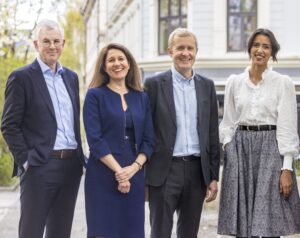2024 began as a year of progress and international cooperation on responsible business conduct. The EU’s Corporate Sustainability Due Diligence Directive (CSDDD) was adopted, and preparations for national implementation were underway. NCP Norway hosted a well-attended seminar in April, welcoming the directive as a landmark development and drawing parallels with Norway’s Transparency Act. Heidi Hautala, one of the key architects of the Directive, delivered the keynote, highlighting the opportunities ahead.
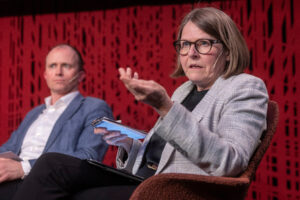
International engagement remained a key priority throughout 2024 and well into this year. NCP Norway participated in the OECD Working Party on Responsible Business Conduct, NCP network meetings in Paris, regional network meetings in Tallinn and Riga, and the OECD sectoral forums on minerals and garments and footwear. We also took part in a CSDDD workshop with policymakers and experts in Lisbon, sharing experiences with due diligence legislation. In a seminar at the UN Forum on Business and Human Rights, we highlighted the importance of regulating smartly and building new regulations on existing international standards.
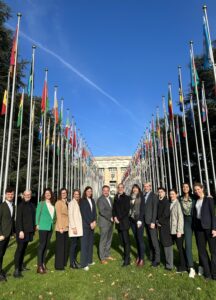
It may be hard to pinpoint exactly when or how the tide turned. But by early 2025, the momentum had slowed down. Calls for deregulation as part of the campaign for “simplification” grew louder. It was disappointing when CSDDD became one of the first suggested “victims” of the EU’s 2025 omnibus legislation. This reversal marked more than just a policy delay – it reflected a broader trend of declining multilateralism and a seemingly growing resistance to diversity, equity, and inclusion. In this climate, the OECD Guidelines – and National Contact Points – are more needed than ever. What can this framework offer in times like these?
The OECD Guidelines offer a stable and internationally agreed framework for responsible business conduct. They provide predictability for companies and a forum for dialogue among governments and stakeholders. When agreed-on principles are under pressure, the need for a common, well-established, point of reference becomes only stronger.
Amid this uncertainty, together with 51 other NCPs, NCP Norway continues to promote responsible and sustainable business practices. Throughout 2024, we engaged directly with a broad range of stakeholders, including different ministries and institutions, the confederation of Norwegian Trade Unions (LO), the Confederation of Norwegian Businesses (NHO), the Confederation of Norwegian Enterprise (Virke), civil society organisations, academia, the Norwegian Human Rights Institution, law firms and foreign service staff. We held presentations, delivered training, and held bilateral meetings – seeking to ensure that discussions and work on due diligence remain active and informed.
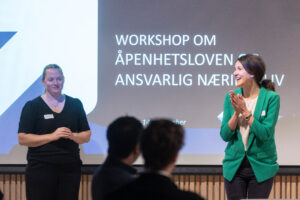
In Norway, the Transparency Act remains in force. The Norwegian Consumer Authority has confirmed that non-compliance may still lead to penalties. A recent government evaluation of the law – supported by input from the NCP – shows that companies find risk-based due diligence to be both manageable and meaningful, as it enables them to focus on areas of highest risks, in line with international standards. This, we would argue, is the result of increased awareness over the last 10 – 20 years among companies of the need to act responsibly in order to remain a sustainable business. The NCP will continue to cooperate with the Norwegian Consumer Authority on workshops for companies on how to carry out due diligence in line with the OECD Guidelines, focusing on issues like stakeholder dialogue and living wages. We have also updated and relaunched the RBC Compass, a free self-assessment tool that gives companies a snapshot of their alignment with the Guidelines. Irrespective of a shifting regulatory landscape, we are confident that responsible companies will continue to carry out due diligence and engage with stakeholders to identify and address adverse impacts on people and the planet.

We will continue to spotlight pressing issues. In 2024 we published an op-ed on corporate responsibility in the Israel-Palestine conflict. This year, we co-hosted a seminar on due diligence in conflict-affected areas, together with the Norwegian Ministry of Foreign Affairs. UN Deputy High Commissioner for Human Rights, Nada al-Nashif, gave the keynote, and experts from UNDP, the private sector and civil society explored how companies can act responsibly in high-risk contexts. Later this year, we will host a seminar on access to remedy and the role of National Contact Points as a non-judicial grievance mechanism.
Last fall, we piloted a new format for stakeholder input: holding meetings with multiple representatives from each stakeholder group – business, trade unions and civil society. This has informed our workplan for 2025. Soon, we will publish a new brochure introducing the NCP, to give greater insight into who we are and how we promote the Guidelines and handle Specific Instances.
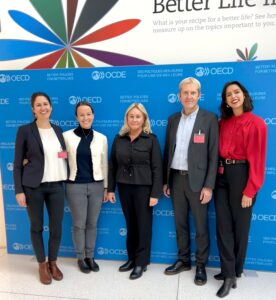
In 2024, NCP Norway said goodbye to longstanding member Gro Granden (LO) and Cathrine Dehli (business representative) – and welcomed two new members: Liv Tørres and Anita Househam. In 2025, the NCP said farewell to engaged member Beate Ekeløve-Slydal and welcomed Carin Leffler from civil society on board. The NCP is fortunate to have members with strong expertise. So, too, does the NCP secretariat: Per Bondevik joined the secretariat, bringing years of relevant experience and warm personality to the team. Åse Sand has been on leave to work with Ethical Trade Norway, and Nadia Ullah has inspired us during the past year with her communication and strategic skills.
Handling Specific Instances remains a key part of our mandate. The NCP’s assessment of the cases involving Aker BP/Aker ASA and Telenor continued in 2024. The Final Statement in the PAX et. al. vs. Aker BP and Aker ASA was recently published, where we concluded that Aker BP’s due diligence in the merger with Lundin Energy Norway did not meet the human rights due diligence expectations in the OECD Guidelines (read more here). The Telenor case concerns a complaint from 474 civil society organisations related to Telenor’s disengagement from Myanmar (read more here). In 2024, we accepted a Specific Instance concerning Statkraft AS and its operations in Chile for further examination. We also followed up on recommendations in the final statement related to the Martin Linge project and the shipyard accident in Korea (read more here). We have recently published our revised case-handling procedures in line with the updates in the OECD Guidelines in 2023, available here in English, Norwegian and Sami.
This year, we are presenting our annual report to the public in a different format. Instead of a traditional report, we are publishing this article, alongside our formal reporting to the OECD. The NCP also reports annually to the mandating ministries about fulfilment of the workplan and budget. We believe that taken together, this provides a comprehensive overview of our activities. In 2024, we reached approximately 1800 people through various events and used 68 percent of our NOK 2.4 million budget to promote the Guidelines and handle Specific Instances. As part of our efforts to strengthen communication and visibility, we also updated our visual identity and design profile. We continue to reflect on how best to communicate our work and impact.
Looking ahead, we are preparing for Arendalsuka – Norway’s largest political gathering – followed by our Peer Review. We are looking forward to receiving a team from the OECD secretariat and the NCPs of Luxembourg and the United States in September and are grateful to all who have filled in the stakeholder questionnaire. This will offer valuable insights into how we are fulfilling our mandate, highlighting where we can improve both promotional work and case-handling – and what adjustments are needed to support the OECD Guidelines’ overarching goal of promoting sustainable development and addressing adverse impacts.
As one of 52 National Contact Points for Responsible Business Conduct, we believe our role is more important than ever. The tide may have turned, but with continued dialogue, shared responsibility, and international cooperation, we believe it can turn again. We are grateful to every individual, company, union, and organisation we’ve engaged with this year – and look forward to tackling the challenges that lie ahead, together.
Wishing everyone a good summer!
